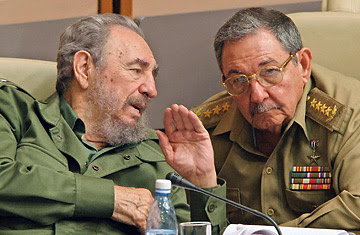Devotion Despite Disillusionment
March 2, 2012 by jelopez
Despite the Special Period – a time marked by dramatic scarcity of resources, the rise of racial and social inequality, the emergence and normalization of black market activity, the exploitation of Cuban bodies and culture to attract and serve the tourist sector, censorship, limited mobility – one aspect of Cubanidad has survived and only seems to become more ingrained in Cuban psyche over time: devotion to la Revolución.
Redefinition has been crucial to its survival. While at one point the state condemned rap music, it now embraces it; it once criminalized homosexuality and now state-sponsored CENESEX promotes discourse on and provides resources to this part of the Cuban population. In its various incarnations, however, Fidel Castro has served as a constant of the revolution for over five decades.
Described by Michelle Chase as “charismatic” and “spontaneous,” Fidel, whom she calls a “crusader,” has succeeded in making “revolution” in Cuba as powerful and persistent a tenet of Cubanidad as the “American Dream” in the United States.

Despite his illness and consequent resignation of presidency in 2008, leaving his brother Raúl in his stead, Fidel continues to play an advisory role in Cuban affairs, acting as “great sage in chief [who] compels the new government to modulate its moves within a policy framework that will not excessively offend [his] sensibilities” (Sweig 226). While he has not made a public appearance in years, his presence remains ever felt, respected, and emulated. After all, he is “hardly one to go quietly” (2009:226).
Throughout his illness, Fidel (though Sweig casts doubt on whether Fidel himself is writing them) has published reflexiones, reflections, through which he preserves revolutionary zeal and devotion and reinforces the view that the revolution’s purpose lies largely in opposing the United States’ imperialist presence and actions. The U.S is a permanent enemy, one that reaffirms the need for continuing the revolution and instills pride in the achievements of that revolution.
On January 8, 2012, Fidel’s reflection criticizes the Tea Party, the fact that Obama’s realization of “the dreams of Martin Luther King Jr. are light years further away than the Earth is from the nearest inhabitable planet,” and satirically muses that the United States’ biggest problem is “the absence in the White House of a robot capable of governing the United States and preventing a war that would put an end to the life of our species” – a robot he suspects registered “Hispanics, Afro-Americans and the growing numbers of the impoverished middle class” would vote for (CubaDebate).
His January 24, 2012 reflection, entitled “The Fruit That Did Not Fall,” is considerably less subtle and more indicative of the ideological fuel the United States’ failures provide for Cuban belief in la revolución. Beginning with an account of how “Cuba found itself forced to fight for its existence against an expansionist power,” he declares that “one cannot be a patriot or a revolutionary without thoroughly understanding” that Jose Marti’s fight was an effort to prevent the United States from expanding. He then declares:
“Current news from Spain, France, Iraq, Afghanistan, Pakistan, Iran, Syria, England, the Malvinas and several other parts of the planet are serious and all foretell political and economic disaster due to the foolhardiness of the United States and its allies.
…
I must point out that the campaign to select a Republican candidate as the possible future president of this globalized and far-reaching empire has become —I say this in all seriousness— the greatest competition of idiocy and ignorance that has ever been heard. But as I have things to do, I cannot dedicate any time to this topic. I knew it would be like this.
…
Bush and his stupidities reigned for eight years at a time when the Cuban Revolution had already lasted for more than half a century. The ripe fruit has never fallen into the lap of the empire. Cuba will never become another force used by the empire to expand over the people of the Americas. Marti’s blood will not have been shed in vain.”
Fidel has given Cuba a cause to trust and an enemy to despise, and the spirit of revolution pulses as vividly and angrily through him as it does through the Cuban people.
Now, what will happen when Fidel Castro dies; what will his legacy become? With Raúl’s liberal economic and ideological shifts away from “Cuba’s heroic struggle against imperialism and its bright socialist future” (Chase 2011), how drastically will the revolution be redefined? If Raúl’s governance fails to deliver the promise that “no one would be abandoned to their fate” and the conditions of the Special Period persist or worsen, Fidel’s words might leave Cubans yearning for the return of their charismatic revolutionary leader, one with determination and hope. If, however, he brings prosperity to the Cuban population in a more equitable and rapid fashion than that of the Special Period, Fidel’s Socialist fire might be reduced to ashes, once and for all.
Sources:
Julia Sweig, Cuba: What Everyone Needs to Know (New York: Oxford University Press, 2009)
Michelle Chase, Cuba Rethinks the Revolution (2011)
Fidel Castro, “The Fruit that Did Not Fall” [English Translation by CubaDebate]
http://en.cubadebate.cu/reflections-fidel/2012/01/26/fruit-that-did-not-fall/
Fidel Castro, “The Best President for the United States” [CubaDebate]
http://en.cubadebate.cu/reflections-fidel/2012/01/26/fruit-that-did-not-fall/
*Original Reflexiones are available on the Granma website:
Leave a Reply
You must be logged in to post a comment.